PCU Paleoecology team attends INQUA Congress in Rome, Italy
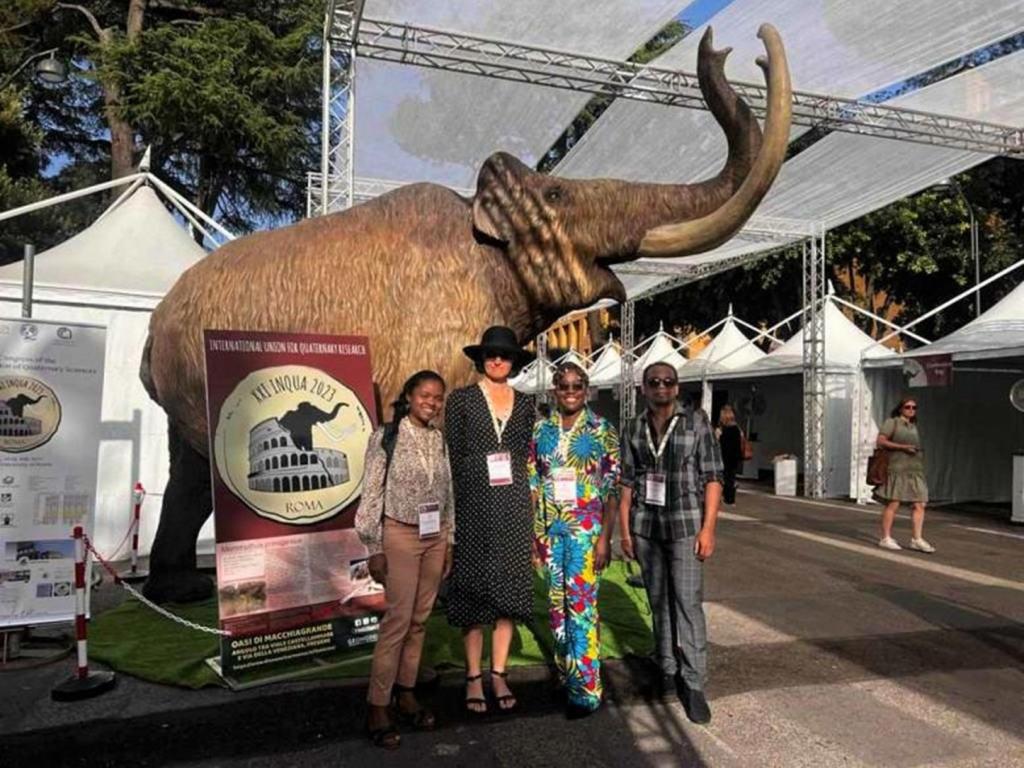
The XXI International Union for Quaternary Research congress took place at the University of Sapienza in Rome, Italy. PCU paleoecology members attended the conference from 14-20 July 2023 to showcase their research.
Ms. Glory Oden, Ph.D candidate presented her results on the Cape Floristic region, highlighting vegetation change in the Jonkershoek area over the past 5000 years. Her study revealed the impacts of European settlers on the landscape, including changes in fire regimes and the introduction of invasive species, which compete with indigenous fynbos ad forest taxa for nutrition and space.
In comparison, the Khoi-Khoi and San hunter-gatherers’ methods of land management seemed more effective in maintaining ecosystem integrity. While the overall result showed biome-level resilience of the fynbos, indicating that critical thresholds may still be uncrossed presently, she recommended a review of fire management policy to reduce available biomass and prevent forest encroachment into fynbos spaces.
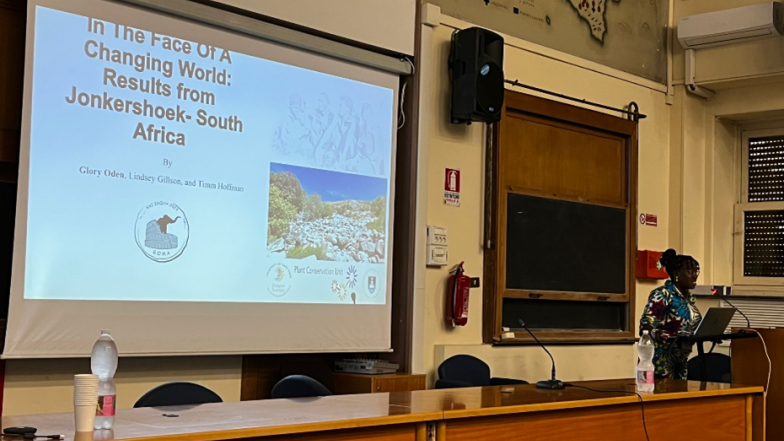
Ms. Oden presenting her results titled “Ecosystem Resilience in the face of a changing world; Results from Jonkershoek -South Africa.”
Mr. Fetra Randriatsara, Ph.D candidate presented preliminary results of his Ph.D, during his presentation, he highlighted the importance of palaeoecological research to the conservation of pristine dry vegetation in the northwest part of Madagascar.
His results suggested that some open ecosystems such as palm savanna, were natural and has existed in the region for the past 5000 years. This biome has been considered a degraded landscape through anthropogenic fire for agricultural and pastoralism activities and subject to a restoration project and fire suppression.
He also found that fire has existed long before the presumed human settlement in the northwestern region (~ca. 2000 BP). Thus, savanna woodland is characterized by the dominance of grass and plants species adapted to fire and dry climate. The results of the study will be utilized as guidelines for the conservation of vegetation in the northwest region in the context of tree planting and fire management.
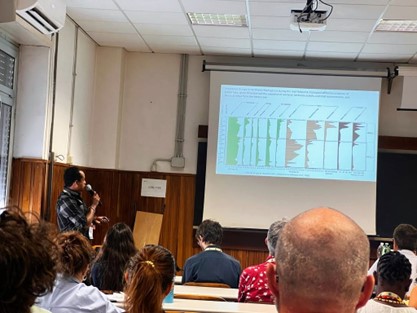
Mr. Randriatsara presenting his results titled “Reconstruction of the vegetation during the mid-Holocene and application to the biodiversity conservation” results from the Komadio core, dry vegetation in the northwest of Madagascar.
Dr. Estelle Razanatsoa presented interdisciplinary research combining palaeoecology, instrumental and historical records along with local knowledge to evaluate the vulnerability to climate change with a focus on drought to local communities and ecological systems in Southwest Madagascar. She found that increased drought will affect communities. Despite these, communities have adaptative capacity that allows them to cope and adapt to the changes on a short and long-term timeframe.
There has also been changes in vegetation over the last 2000 years which will affect the ecological integrity of the systems in the region. This will have implications on migration, food security and biodiversity conservation. Such findings are important for planning sustainable management in the region in the face of climate change.
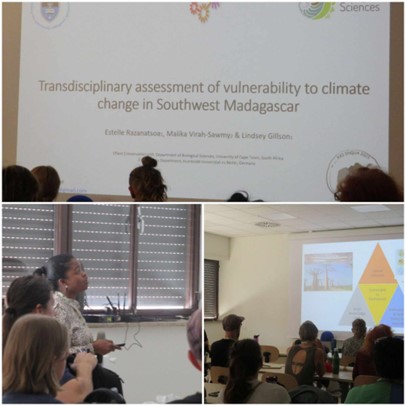
Dr. Razanatsoa presenting during the session on “How can archaeology, palaeoecology, traditional knowledge and more than human approaches contributes towards a more sustainable and culturally informed future.”
Professor Lindsey Gillson with Professor Willy Tinner (University of Berne) convened a conference session on Palaeoecology in Restoration Ecology. The sessions comprised two oral and one poster session and formed part of the “Palaeoecology as a tool for ecosystem management” theme. The aim of the sessions was to highlight the UN Decade of Ecosystem Restoration and to encourage palaeoecologists to apply their findings to ecological restoration, which often lacks long-term data to use as reference conditions.
The diverse array of talks and posters included research from peatlands, moorland, European forests, and Australian savannas and included applications in lake management, fire management, insect conservation and mangrove restoration. “It is important that palaeoecologists present their work in ways that can be directly applied in ecosystem management,” says Gillson. “Our sessions demonstrated the huge and largely untapped potential of palaeoecology to contribute to the restoration of ecosystems.”Moreover, Prof Lindsey Gillson and the Planetary Boundaries Working Group organised a mid-conference workshop on “Exploring the interface between Sustainability and Palaeoecology”. During the initial segment of the workshop, Lindsey Gillson provided valuable insights into the potential contributions of palaeoecology to the existing Planetary Boundaries literature, and outlined the overarching objectives of the working group. In the second part of the workshop, Ondrej Mottl and Alistair Seddon led a hands-on data processing exercise in R, where attendees actively engaged with the application of advanced analytical techniques. This practical exercise served as a foundation for participants to explore and understand the utilization of palaeoecological data within the Planetary Boundaries context. For those interested, the code for this exercise can be found here
In the third part of the workshop, Ke Zhang introduced an intriguing case study involving lakes in China, illustrating the group's progress to date in the practical application of palaeoecology towards understanding and addressing planetary boundaries. Throughout the workshop, there were extensive discussions on the potential utilization of palaeoecological data to develop metrics for planetary boundaries. This collaborative environment was a pivotal factor in fostering valuable interactions and laying the groundwork for a broader array of case studies.
The workshop not only offered a platform for the Planetary Boundaries Working Group to gain exposure but also set the stage for further research endeavours. The group envisions a promising trajectory towards the establishment of regional or even global meta-analyses, bringing us closer to a more sustainable and resilient future.
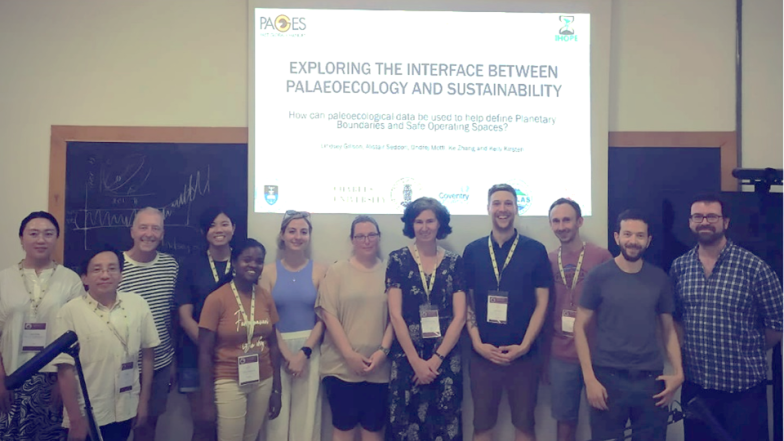
Planetary Boundaries Working Group, led by Lindsey Gillson held a workshop at INQUA.
The conference provided a platform to showcase research but also allowed particularly early career from the lab to network and develop their career on an international stage. “The conference was successful and looking forward to hearing more updated results and outputs for the next INQUA to be held in India,” said Mr. Randriatsara.
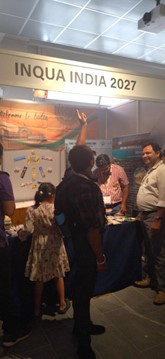
Mr. Randriatsara at India's showcase: Indian researchers and students showcased and shared information about India and their quaternary research, preparing to host the next INQUA congress in 2027.
We acknowledge the support of the following: The UCT Vice Chancellor’s Future Leaders programme, MRI and partners through the SDC program for ER, @INQUARoma2023 support funding for FR and GO was funded by PAST and UCT Travel Grant and NRF.
